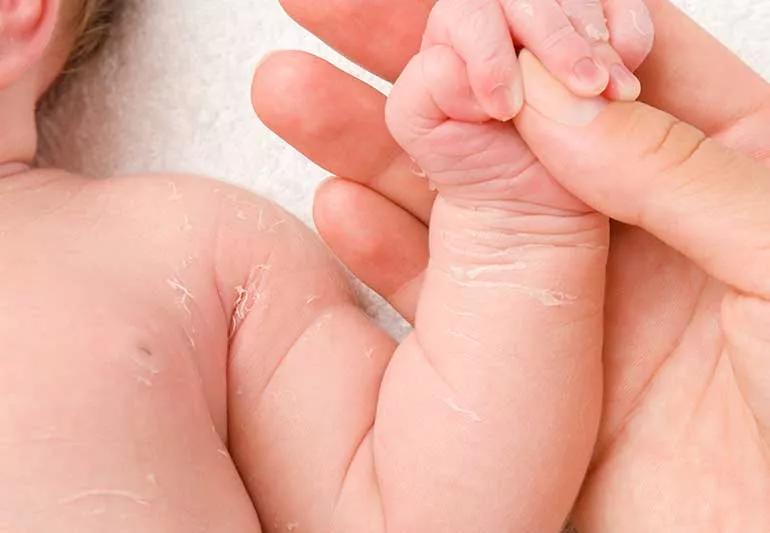All babies go through a perfectly normal peeling phase in the first couple weeks

Image content: This image is available to view online.
View image online (https://assets.clevelandclinic.org/transform/0aa9e509-65dd-4e76-8212-c24dbf17f234/newborn-skin-peeling-1165471859-770x533-1_jpg)
newborn baby skin peeling
There’s nothing like the soft feel of your newborn’s skin. But when your infant’s skin goes from perfect to peeling just days after birth, it’s natural to be concerned.
Advertisement
Cleveland Clinic is a non-profit academic medical center. Advertising on our site helps support our mission. We do not endorse non-Cleveland Clinic products or services. Policy
“Newborn skin has a lot of adjusting to do after going from the uterus to the outside world,” says pediatrician Marni Turell, MD. “The trick is knowing what’s normal and how to handle it.”
Peeling skin may feel unexpected but it’s not uncommon. Dr. Turell shares what you need to know about peeling newborn skin and how to care for it.
All newborns undergo a peeling phase during the first two weeks of life. It typically happens on the arms and legs, but you may also see peeling on their belly, back or butt. If you only notice flaking skin on their scalp, it’s likely your newborn has cradle cap — a harmless buildup of scaly patches on the scalp.
The degree of newborn peeling can vary, and it’s not necessarily a sign your infant has dry skin. The outer layer of peeling skin may be dry, but the skin underneath may not be.
“Peeling skin on newborns is similar to molting,” Dr. Turell notes. “The outer layer of skin is peeling off for the under layer of healthy skin to take over.”
But some babies have peeling skin and dry skin. Here’s how you can tell the difference: Newborn peeling generally ends after two weeks, while dry skin can stick around for a long time or be a chronic issue. If the dryness doesn’t go away, see your healthcare provider.
Advertisement
Peeling skin can happen with newborns for several reasons — some more common than others.
The peeling that occurs because of pregnancy and birth typically goes away on its own in a couple weeks. Pregnancy can cause peeling skin due to:
Sometimes, peeling may signal a skin condition. Your pediatrician (or a dermatologist) can help diagnose these conditions and offer safe, effective treatments. These skin issues include:
Advertisement
The peeling that happens to newborn skin doesn’t usually need special medical treatment. It should stop on its own within a couple of weeks. But here are five tips to help protect your baby’s skin during the peeling process.
When you see peeling skin, your first instinct may be to help it along. Avoid that temptation.
“Don’t peel or remove the skin because it’s protecting new skin underneath,” Dr. Turell states. “The best thing you can do is let it fall off on its own.”
Add moisture if you want to do something helpful during the peeling phase. “Slather on an emollient such as Vaseline® or Aquaphor® or any petroleum-based moisturizer,” Dr. Turell suggests. “It’s probably not going to make the skin look better, but it won’t hurt.”
Adding moisture also helps keep the new skin healthy and protected. In the early weeks and months — even after the peeling phase has passed — continue to care for their new skin by:
You should wash your newborn with a sponge bath (that is, using a soapy washcloth to clean them up, rather than putting them in water) until the umbilical cord falls off and the circumcision (if your baby had one) heals. But be gentle to avoid pulling off too much of their peeling skin.
Advertisement
“Only use a soft washcloth or your hands,” Dr. Turell advises. “You don’t need to scrub the skin.”
Use lukewarm water to keep the skin from becoming dry. Baths should be short — no longer than 10 minutes.
Harsh chemicals can irritate delicate baby skin. When choosing shampoo, soap and lotions, look for fragrance-free products.
Stick to gentle products when laundering baby’s clothing, too. Chemicals and fragrances in a newborn’s clothing can also irritate their skin.
Hydrating from within is as important as moisturizing the surface of their skin. Make sure your infant is getting enough breast milk or formula. But never give a baby water to drink during the first six months of life. Talk to your healthcare provider if you have concerns about how much your baby is eating.
Most peeling will improve on its own, but Dr. Turell notes that there are a few instances when you should seek medical care. Call your pediatrician if your infant’s skin:
“If the skin looks angry and red or your infant is uncomfortable or has a fever, make an appointment with your pediatrician,” Dr. Turell stresses. “It may be a sign of infection or a more serious condition.”
Advertisement

Sign up for our Health Essentials emails for expert guidance on nutrition, fitness, sleep, skin care and more.
Learn more about our editorial process.
Advertisement
Gentle care, like moisturizing, washing and soft brushing, can help clear up cradle cap
Gripe water isn’t regulated by the FDA, and research doesn’t support its use
Jaundice that’s present at birth or lasts more than a week should be evaluated by a pediatrician
When tight neck muscles give your newborn a head tilt, these gentle exercises can go a long way
Crossed eyes in a newborn are fairly common, typically harmless and usually go away
Neonatal opioid withdrawal syndrome, or NOWS, can develop when a fetus is exposed to opioids, nonmedical drugs or even some prescription drugs during pregnancy
Most parents report an improvement in breastfeeding, but there’s a chance the procedure won’t solve the issue
Dietary and behavioral changes can help get things moving again
Prioritize your health by managing stress, strengthening your social connections and getting quality sleep
Bolsters, blankets, pillows and blocks can offer extra support, stability and comfort
Allergies, postnasal drip, asthma or reflux could be to blame for a cough that won’t quit